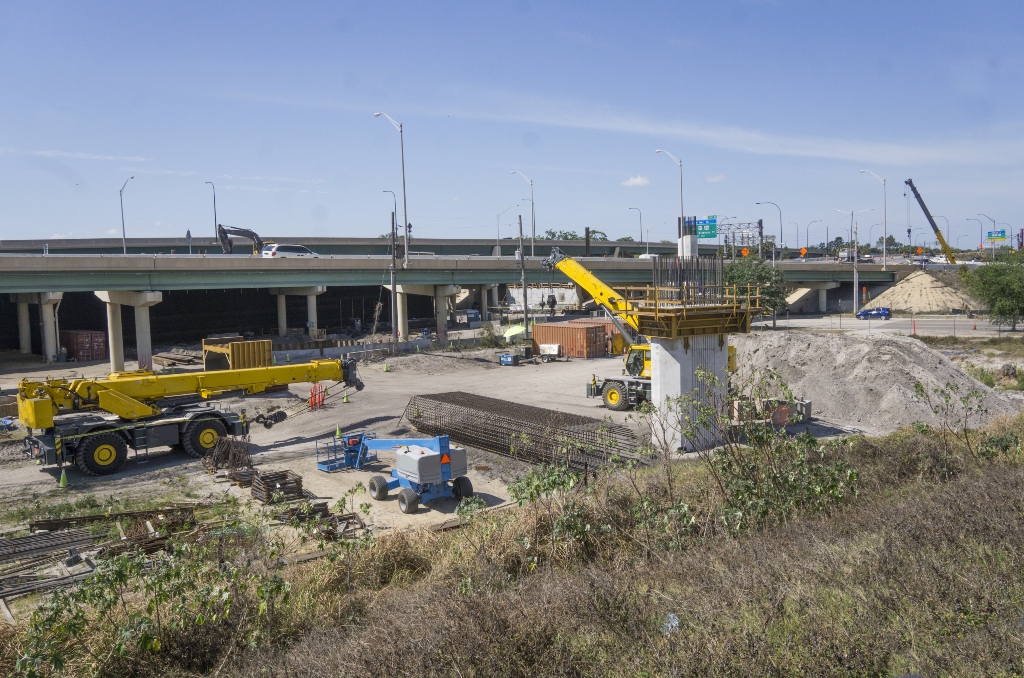Radioactive material to be used in road building in Florida – Machinery for road construction in use on freeways – Courtesy: Shutterstock – Image by Timothy OLeary
Orlando, FL. – Governor DeSantis is being urged by environmental organizations all across the Southeast of the United States to veto a law that would permit the use of radioactive fertilizer waste in road building throughout the state.
The legislation approved by lawmakers authorizes the use of hazardous phosphogypsum in Florida “demonstration” road projects. Critics claimed that this is just the beginning of a push by the phosphate industry to eventually use the waste in all of the nation’s roads.
The use of toxic phosphate waste in road building is forbidden by the Environmental Protection Agency because it poses an intolerable risk to the environment, the public’s health, and the safety of road construction workers.
According to the proposed legislation, the Florida Department of Transportation would have until April 1, 2024, to complete a feasibility study on the use of phosphogypsum as a material for road building.
“The only way Gov. DeSantis can assure Floridians he’s serious about protecting them from this radioactive waste is to veto this reckless bill,” said Ragan Whitlock, a Florida-based attorney with the Center for Biological Diversity. “This dangerous plan to pave Florida’s roads with toxic phosphate mining waste is an egregious handout to an industry that has a lengthy history of damaging the environment and putting public health at risk.”
Phosphogypsum must currently be stored in “gypstacks” that are hundreds of acres broad and hundreds of feet tall, according to the EPA.
In 25 stacks in Florida, more than 1 billion tons of radioactive waste have already been accumulated.
The industry has a history of poor management when it comes to phosphogypsum waste, according to a news release from the groups opposing this bill. The stacks are vulnerable to spills and sinkholes that endanger Tampa Bay and the Floridan Aquifer, like the breach at Piney Point and the sinkhole at New Wales.
“No environmentally conscious or ‘green’ governor worth his salt would ever sign a bill into law approving roadbuilding with radioactive materials,” said Rachael Curran, an attorney with People for Protecting Peace River. “Even the fast-tracked ‘study’ contemplated by this industry-sponsored bill would create harm because that study involves a full-scale road project that would have very real, very detrimental impacts to the environment and health of Floridians, especially road-construction crews.”
The EPA under Donald Trump authorized the use of phosphogypsum in roadways in 2020. In 2021, the EPA rescinded the approval in response to a lawsuit and petition filed by the Center and other union, public health, and conservation organizations.
The announcement added that putting radioactive phosphogypsum in roads would relieve the fertilizer industry of its responsibility to securely dispose of the millions of tons of hazardous waste it produces each year while providing another revenue stream for industry titans.
Stories that matter are our priority. At Florida Insider, we make sure that the information we provide our readers is accurate, easy-to-read, and informative. Whether you are interested in business, education, government, history, sports, real estate, nature or travel: we have something for everyone. Follow along for the best stories in the Sunshine State.
Chris began his writing as a hobby while attending Florida Southern College in Lakeland, Florida. Today he and his wife live in the Orlando area with their three children and dog.

